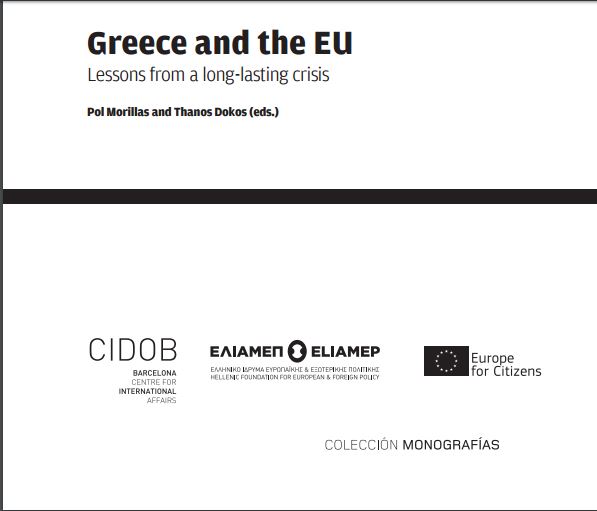Bardakas, Ioanna C., (2016), “Structural and Cyclical Factors of Greece’s Current Account Balances: A Note”, Bank of Greece, Αpril This note examines the relative importance of cyclical and structural factors in determining Greece’s current account performance. I use a number of filters to remove the long-term component and isolate the cyclical factors. It is shown that for the last 15- years the structural component explains most of the variation in the …Read More
This radicalisation which is not one: contentious politics against the backdrop of the Greek crisis
Voutyras, Savvas, (2016), “This radicalisation which is not one: contentious politics against the backdrop of the Greek crisis”, Journal of Contemporary European Studies, Volume 24 Issue 2, 4 March Since the eruption of the Greek economic crisis in 2010 and the introduction of austerity policies, Greece’s public space has become a theatre of intense political conflict in the form of social unrest, mass mobilisations, symbolic and physical clashes and political instability. …Read More
The Analytics of the Greek Crisis
Gourinchas, Pierre-Olivier, Philippon, Thomas, Vayanos, Dimitri, (2016), “The Analytics of the Greek Crisis”, Centre for Economic Policy Research, June We provide an empirical and theoretical analysis of the Greek Crisis of 2010. We first benchmark the crisis against all episodes of sudden stops, sovereign debt crises, and lending boom/busts in emerging and advanced economies since 1980. The decline in Greece’s output, especially investment, is deeper and more persistent than in almost any …Read More
Greece And Japan: A Tale Of Two Debt Write-Downs
Turner, Adair, (2016), “Greece And Japan: A Tale Of Two Debt Write-Downs”, Social Europe, 16 June At the end of 2015, Greece’s public debt was 176% of GDP, while Japan’s debt ratio was 248%. Neither government will ever repay all they owe. Write-offs and monetization are inevitable, putting both countries in a sort of global vanguard. With total public and private debt worldwide at 215% of world GDP and rising, the tools on which Greece and Japan …Read More
Liberals, Socialists, and pork-barrel politics in Greece
Psycharis, Yannis, Rodríguez-Pose, Andrés, Tselios, Vassilis, (2016), “Liberals, Socialists, and pork-barrel politics in Greece”, Centre for Economic Policy Research, June This paper analyses the role of pork-barrel politics in the allocation of public investment expenditures in Greece. It proposes a model which explicitly relates the allocation of public investment to electoral results using a unique dataset covering the period from the restoration of democracy in 1974 until 2009, just before the Great Recession …Read More
Greeks and Social Europe
Dimitri A. Sotiropoulos, (2016), “Greeks and Social Europe”, EU Forum, 8 Ιουνίου In pre-crisis Greece, Social Europe used to mean a welcome invitation to make Greece’s living standards converge with those of the rest of the EU. It also meant a less welcome push to introduce into Greece labour market and pension reforms, which would alter a patronage-based divide between insiders and outsiders. European social policies, including active labor market policies …Read More
Can Greece shake off its political passivity?
Petsinis, Vassilis, (2016), “Can Greece shake off its political passivity?”, European Council of Foreign Relations, 27 May The public mood in Greece has gone through three stages since January 2015: optimism, agony, and passivity. The first stage, optimism, corresponds to the first months after Syriza’s victory in the elections of January 2015, when a positive turn for Greece seemed possible in spite of the critical situation in the country. The second …Read More
Greece and the EU. Lessons from a Long-lasting Crisis
Pol Morillas, Thanos Dokos, (2016), “Greece and the EU. Lessons from a Long-lasting Crisis”, CIDOB Monographs, May Less than a year ago, the Greek crisis reached its highest level of tension. After arduous negotiations, the Greek government and its creditors signed the agreement for a third bailout in July 2015,which should provide liquidity to the Greek public sector in return for a severe programme of deficit adjustment and structural reforms. At the …Read More
Greece : Preliminary Debt Sustainability Analysis-Updated Estimates and Further Considerations
IMF, “Greece : Preliminary Debt Sustainability Analysis-Updated Estimates and Further Considerations”, Country Report No. 16/130, 23 May Greece continues to face a daunting fiscal consolidation challenge. After seven years of recession and a structural adjustment of 16 percent of GDP, Greece has only managed to achieve a small primary surplus in 2015, and this due to sizeable one-off factors. This is still far away from its ambitious medium-term primary surplus target of …Read More
Policing the crisis in Greece: The others’ side of the story
Vasilaki, Rosa, (2016), “Policing the crisis in Greece: The others’ side of the story”, GreeSE Paper No.98, April 2016 This article looks at the experience of policing protests in Greece during the period of the crisis from the point of view of police officers. Policing in Greece – and especially the subjective experience of police officers themselves – is a non-subject of sociological research for historical and political reasons peculiar to Greece and …Read More





